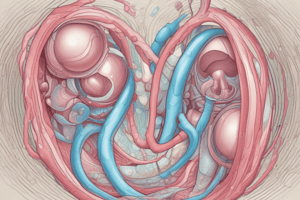Podcast
Questions and Answers
What dietary factor is associated with increasing the risk of urinary tract infections in patients with benign prostatic hyperplasia (BPH)?
What dietary factor is associated with increasing the risk of urinary tract infections in patients with benign prostatic hyperplasia (BPH)?
- High-fiber diet
- Low-sodium diet
- High-purine diet (correct)
- Low-carbohydrate diet
Which condition is likely to indicate that a nurse should monitor a client for signs of acute renal failure?
Which condition is likely to indicate that a nurse should monitor a client for signs of acute renal failure?
- Bradycardia
- Increased appetite
- Frequent urination
- Hypertension (correct)
What teaching method should be included in a plan to prevent urinary tract infections?
What teaching method should be included in a plan to prevent urinary tract infections?
- Maintaining adequate fluid intake (correct)
- Wearing cotton underwear
- Using scented hygiene products
- Taking vitamin supplements
Which of the following is least likely to contribute to the risk of urinary tract infections?
Which of the following is least likely to contribute to the risk of urinary tract infections?
What sign should a nurse monitor for in a client with glomerulonephritis at risk of acute renal failure?
What sign should a nurse monitor for in a client with glomerulonephritis at risk of acute renal failure?
Which factor is NOT a predisposing factor for urinary tract infections?
Which factor is NOT a predisposing factor for urinary tract infections?
Which option is an appropriate dietary recommendation for a client at risk for renal calculi?
Which option is an appropriate dietary recommendation for a client at risk for renal calculi?
In assessing risk factors for urinary tract infections, which lifestyle change is most recommended?
In assessing risk factors for urinary tract infections, which lifestyle change is most recommended?
What occurs when the loss of ECF volume exceeds the intake of fluids?
What occurs when the loss of ECF volume exceeds the intake of fluids?
Which method is recommended first to help a woman with stress incontinence after childbirth?
Which method is recommended first to help a woman with stress incontinence after childbirth?
Which clinical assessment finding would confirm fluid volume deficit?
Which clinical assessment finding would confirm fluid volume deficit?
What is a consequence of losing water and electrolytes in the same proportion?
What is a consequence of losing water and electrolytes in the same proportion?
What is a potential drawback of using incontinence pads for stress incontinence?
What is a potential drawback of using incontinence pads for stress incontinence?
Which of the following conditions can potentially exacerbate fluid volume deficit?
Which of the following conditions can potentially exacerbate fluid volume deficit?
What approach should be avoided in the management of stress incontinence?
What approach should be avoided in the management of stress incontinence?
What might dry mucous membranes indicate in a clinical assessment?
What might dry mucous membranes indicate in a clinical assessment?
What clinical sign indicates dehydration?
What clinical sign indicates dehydration?
How does Lasix affect fluid levels in the body?
How does Lasix affect fluid levels in the body?
In a patient with fluid volume deficit, what change is expected in BUN and creatinine levels?
In a patient with fluid volume deficit, what change is expected in BUN and creatinine levels?
What is a confirmed diagnosis for a patient with a potassium level of 5.7 mEq/L?
What is a confirmed diagnosis for a patient with a potassium level of 5.7 mEq/L?
What laboratory finding usually increases with dehydration?
What laboratory finding usually increases with dehydration?
Which situation can lead to an elevated potassium level?
Which situation can lead to an elevated potassium level?
What is a common clinical sign associated with fluid overload?
What is a common clinical sign associated with fluid overload?
Which of the following is not a confirming sign of dehydration?
Which of the following is not a confirming sign of dehydration?
Which nursing diagnosis is most relevant for a patient with isotonic fluid volume deficit?
Which nursing diagnosis is most relevant for a patient with isotonic fluid volume deficit?
What consequence might occur due to over administration of potassium sparing diuretics?
What consequence might occur due to over administration of potassium sparing diuretics?
What laboratory finding would you expect to see in a patient with elevated potassium levels?
What laboratory finding would you expect to see in a patient with elevated potassium levels?
What is a possible effect of decreased renal perfusion in a patient?
What is a possible effect of decreased renal perfusion in a patient?
Which nursing diagnosis might not be relevant for a patient with fluid volume deficit?
Which nursing diagnosis might not be relevant for a patient with fluid volume deficit?
Which condition is characterized by diarrhea and vomiting leading to decreased urine sodium?
Which condition is characterized by diarrhea and vomiting leading to decreased urine sodium?
What could be a primary concern for a client receiving corticosteroids?
What could be a primary concern for a client receiving corticosteroids?
Which vital sign change would likely accompany fluid volume deficit?
Which vital sign change would likely accompany fluid volume deficit?
What is a primary ECG indicator of hyperkalemia?
What is a primary ECG indicator of hyperkalemia?
Which symptom is NOT associated with severe hyperkalemia?
Which symptom is NOT associated with severe hyperkalemia?
What mechanism leads to hyponatremia in a case of hypervolemic hyponatremia?
What mechanism leads to hyponatremia in a case of hypervolemic hyponatremia?
Which diuretic is commonly used as a potassium-wasting agent?
Which diuretic is commonly used as a potassium-wasting agent?
What serious clinical manifestation may occur when serum potassium reaches 7.0 mEq/L?
What serious clinical manifestation may occur when serum potassium reaches 7.0 mEq/L?
Which of the following is a potential cause of hypervolemic hyponatremia?
Which of the following is a potential cause of hypervolemic hyponatremia?
Which type of electrolyte imbalance is indicated by a serum calcium level of 7.2 mg/dl?
Which type of electrolyte imbalance is indicated by a serum calcium level of 7.2 mg/dl?
What is the implication of a prolonged PR interval on an ECG?
What is the implication of a prolonged PR interval on an ECG?
Study Notes
Urinary Tract Infections
- Foul-smelling urine can be a sign of a urinary tract infection (UTI).
- Benign prostatic hyperplasia (BPH) is a risk factor for UTIs because it causes urinary stasis.
- A high-purine diet is associated with renal calculi, not UTIs.
Urinary Tract Infection Prevention
- Maintaining adequate fluid intake is a key recommendation for preventing UTIs.
- Wearing underwear made of synthetic material like nylon is not a recommended preventative measure.
Urinary Incontinence
- Kegel exercises are often recommended for women with stress incontinence.
- Stress incontinence is a condition where urine leaks when sneezing or laughing.
- Incontinence pads do not resolve the problem of stress incontinence.
Fluid Volume Deficit (FVD)
- A dry mucous membrane is a clinical sign of dehydration.
- FVD occurs when the loss of extracellular fluid (ECF) volume exceeds the intake of fluids.
- A 1 lb weight loss can be associated with dehydration but is not a confirming sign.
- Engorged neck veins and a bounding pulse are signs of fluid overload, not FVD.
- FVD can lead to increased BUN and Creatinine levels.
- Lasix (furosemide) is a diuretic that can exacerbate FVD.
Hyperkalemia
- Hyperkalemia is a condition where the potassium level in the blood is above 5.7 mEq/L.
- Frequent episodes of diarrhea, vomiting, and administration of corticosteroids contribute to hypokaleimia, not hyperkalemia.
- Potassium-sparing diuretics can cause hyperkalemia by conserving potassium in the body.
- Hyperkalemia can be detected on an ECG by the presence of a tall, peaked T wave.
- A prolonged QT interval on an ECG indicates a delay in conduction between the atria and ventricles.
- A U wave and a depressed ST segment on an ECG are present with hypokalemia.
- Lasix is used to treat hyperkalemia because it is a potassium-wasting diuretic.
Hyponatremia
- Hypervolemic hyponatremia occurs when the body's water volume increases but sodium levels remain the same.
- Syndrome of Inappropriate Antidiuretic Hormone (SIADH) can lead to hypervolemic hyponatremia because ADH retains water in the body, diluting sodium.
Calcium Imbalance
- A calcium level of 7.2 mg/dl is considered low.
Studying That Suits You
Use AI to generate personalized quizzes and flashcards to suit your learning preferences.
Related Documents
Description
This quiz covers essential knowledge about urinary tract infections (UTIs), their prevention, urinary incontinence, and fluid volume deficit. Test your understanding of symptoms, risk factors, and preventive measures related to these health topics. Prepare to enhance your knowledge in urology and related medical fields.




